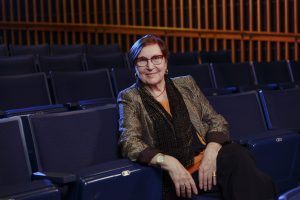
On this edition of defining experts, we are honoring Ula Stoeckl, former Associate Professor of Film and Veteran German Filmmaker.
Ula Stoeckl is one of Germany’s most important Filmmakers. She has produced and directed over ten feature films in Germany, including Sleep of Reason, Erika’s Reason, A Very Perfect Couple, and six documentaries. Her work has been shown at major European festivals (most recently at the Berlin Film Festival), at the Chicago International Film Festival, and the Toronto International Film Festival. Four of her features have been shown in America with the sponsorship of the Goethe Institute. She is on the selection committees for both the Berlin and Venice Film Festivals.
She has lectured and taught widely, including Hollins University, The Berlin Academy of Film and Television, the University of Texas at Austin, and American University. She has received many awards, including the prestigious Konrad-Wolf-Preis cultural achievement award in 1999. Her most successful film is the Sleep of Reason, for which she received the Deutschen Filmpreis (considered Germany’s greatest film prize) in 1984 and the German Critics Film Prize.
When talking about her journey to becoming a filmmaker, she starts from the very beginning. “When I started to think about wanting to become a screenwriter, I had no idea about the industry and what it meant. I think my fortune was that I had very early access to theater, as my father was a musician in my hometown’s theater. As I grew up as a child in WWII, I think my very early let out for my feelings and emotions was writing. Therefore, it was quite clear that I wanted to have a career as a screenwriter,” Stoeckl says.
She adds by saying that her journey was not always easy because not only was she the first woman in her film school, but her own father did not want her to go that route. “I did not always think of writing, because when I was little…having a dad among artists, he was not so keen of having me be an artist, so I should learn something where I can earn my life with when I could not be successful as an artist. So, I learned languages and had a job in an office and that was so boring that I started to go on writing. The influence of my mother…she was singing with us, she was telling us stories, fairytales; so I grew up not only with theater but with fairytales, literature, and everything that makes your fantasy go as a child.” Additionally, she states, “I was the first woman at that film school, of course, without knowing why I did that, I was also very obstinate and focused on women and women’s problems. And that was interesting for my young teachers too. And what I took away from that for my teaching is to give my students all the possibilities I can to find out what their interests in film making might be.”
When asked what languages she writes her film in, she replies that, “I write most films in German. That’s another thing about language; you are never as clever as you are in your own language. You can learn whatever you want in a foreign language, but it’s not your language. In German, you also have different dialects, so from region to region it’s very different. And for me, it’s very interesting till today, because it forms peoples’ characters.”
“When I started film school, the first thing I was asked to do was make a short film even when I have never made any film. And being German, and having the history of my country, I was always very occupied with the question of ‘how do people find the courage to resist?’ Because in normal life, people do no even have the courage to tell their boss what they think of him, or his methods and it does not cost your life. Antigone was the story of a sister who could not accept that one of her brothers should not be buried but left buried in the streets because he was against the king….that was my first short film idea in ’62 or ‘63.”
Finally, Stoeckl gives advice to students who want to find their passion in filmmaking. “I think [we need these types of films] more than ever because what I see is that students today are so much ordered what they have to do to get good grades…it’s the only interest they have. In my personal opinion, they do not have the possibility to find out themselves what are the questions I have underneath all that. And it comes back to finding out why they are interested in certain subjects.
Lisa Mills, Professor and Assistant Director, Film and Mass Media, discusses her experience working with Stoeckl and offers good wishes for the future: “Over her years of teaching and service Ula provided a guiding hand to many students and faculty members, particularly the women. She helped me find my voice as a filmmaker and encouraged me to step into leadership. I learned from her by watching her speak her mind as a female artist. It has been such an honor working with her, and she will always be an inspiration.”
By Majdulina Hamed.
Published to Nicholson News on May 7th, 2024.
If you have any news, accomplishments or highlights about your work or life, please be sure to share them with us, by emailing us at NicholsonNews@ucf.edu.